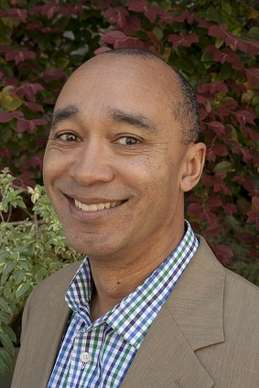Peer to Peer Blog > Ramekon O'Arwisters: Social Practice Work
 |
How would you describe your career trajectory? What major challenges did you face to get where you are today and how did you confront those challenges?
When I was young, my focus was painting and drawing on paper and canvas. I later created art with social commentary. Much of that work included using commercial objects that depicted stereotypical references of race and sexuality associated to black America. Now, I am a social-practice artist who uses the folk-art tradition of crocheting rag rugs to foster social interaction, liberation and creativity.
One major challenge that I faced to get where I am today was making the time to create art while maintaining a full-time job. I felt that no one would take my work seriously if I did not respect my talent and artistic skills enough to commit to making my art. This meant setting dedicated time to being in the studio, after work and late at night, plus working weekends in my studio.
Another major challenge was learning to incorporate business and social media skills into my practice. I finally realized that if I did not acquire the business skills to promote and market my social-art practice, my art career would plateau or worse — I'd lose interest.
Please describe the activity through which you engaged with CCI (i.e. Business of Art, Grant Program, etc). Why did you want to do it? What did you gain/learn from that experience?
Through CCI and the San Francisco Arts Commission's Cultural Equity Grant Program, I improved my business acumen with CCI’s Business of Art classes. I became an entrepreneur, launching my professional art career with knowledge, tools and resources that successfully advanced my work in the art world. CCF Quick Grants have provided professional development reimbursement funds for me to hire an art-career coach — a very wise move! Working with my career coach has sharpened my commitment to my artistic goals through a five-year strategic plan that includes time management, promotional skills, marketing, grant writing and social media skills.
What advice/direction do you wish someone had given you when you embarked on your career?
When I embarked on my career, I wished someone had told me to fully embrace all the different or "perceived" negative parts of myself that were inculcated from my history, culture, race, pain, anger, and sexuality. I wished they had encouraged me to search for the interrelated aspects of my identity, especially characteristics that appear to be opposites, and to consciously learn how to link the unlikely — transforming pain and anger into art and beauty.
Ramekon O’Arwisters is a social-practice artist who creates collaborative, community-based art projects infused with folk-art traditions and techniques to foster and support a culture of community building. O’Arwisters’s Crochet Jams invite the public, friends, volunteers, and associates to participate in the traditional folk art of making rag rugs. As a thought leader, O’Arwisters engages the public in thinking differently about the role of art within community and the power of art within society. He has had exhibitions at the Luggage Store Gallery in San Francisco, and the Kato Gallery in Tokyo. His work has been included in numerous San Francisco group exhibitions including the African American Art & Cultural Complex, and the Museum of the African Diaspora. In 2013 he participated in a residency at the M. H. de Young Museum in San Francisco. He was awarded an Artadia Award in 2002 and a second San Francisco Arts Commission Individual Artist Grant in 2011. O’Arwisters received a Masters of Divinity from Duke University. He is currently curator of exhibitions at SFO Museum and a guest lecturer at various Bay Area colleges.
website: www.crochetjam.com